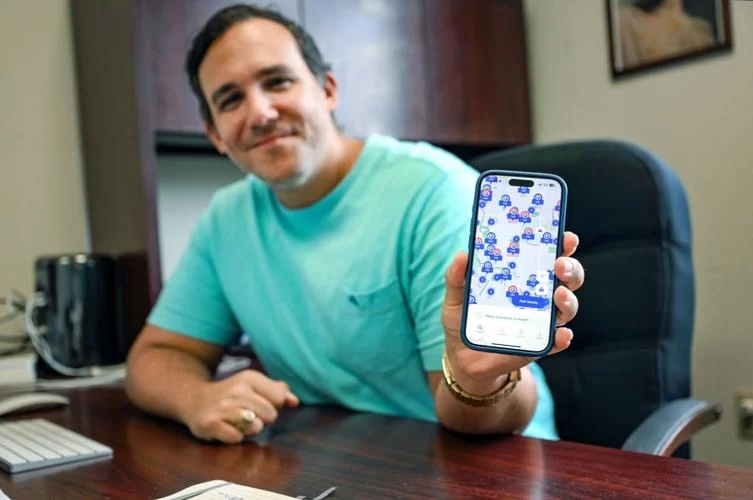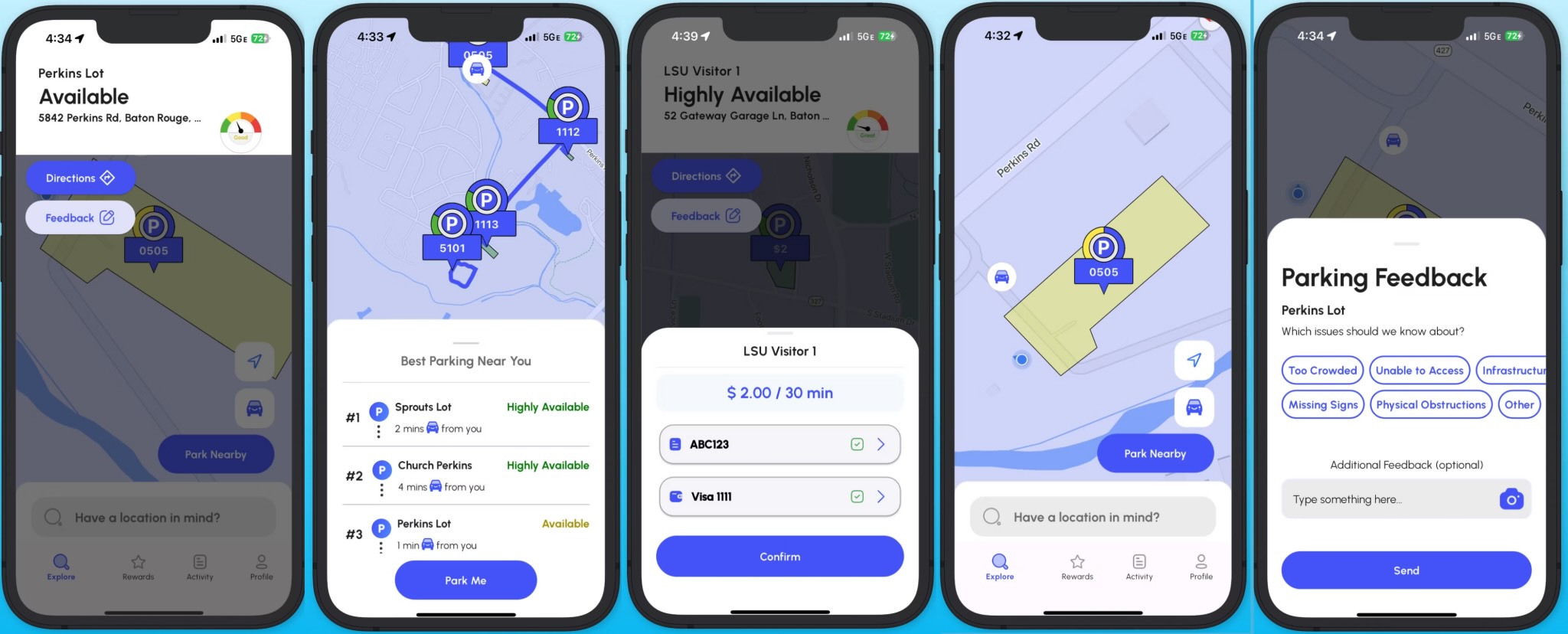From Stars to Streets: How Dr. Manos Chatzopoulos Turns Astrophysics into Real-World Solutions with ParkZen
June 11, 2025

Dr. Manos Chatzopoulos, Associate Professor of Physics & Astronomy, is on a mission to deliver the most innovative parking solution through ParkZen.
– Photo Credit: The Advocate
Parking may seem like a mundane frustration until you’re circling a packed lot, running late, and wondering why no one has solved this yet. At LSU, Associate Professor of Physics & Astronomy Dr. Manos Chatzopoulos is tackling that very problem by turning his astrophysics expertise into practical technology.
Using the same computational tools he applies to simulate massive cosmic explosions, Chatzopoulos co-founded ParkZen, a smartphone-based app that helps people find available parking spaces in real time—no infrastructure required.
“My research focuses on understanding the lives and explosive deaths of massive stars—especially rare and powerful events like superluminous supernovae and other luminous cosmic transients. Since joining LSU, I’ve also become increasingly interested in massive binary star systems and what happens when two stars in such systems merge.” However, beyond the telescopes and simulations, he found a way to bring those same data modeling skills down to Earth—literally—to help people park their cars faster, smarter, and more sustainably.
Parking as a Daily Struggle
For many drivers, particularly in dense urban or university environments, parking is an unpredictable hassle. “I was a postdoc at the University of Chicago and constantly battling for parking in Hyde Park,” Chatzopoulos recalls. “It felt like falling into a black hole—once you went in, you couldn’t get out.”
That persistent problem sparked an idea. What if you could crowdsource parking information using smartphone sensor data and guide people in real time to open spots?

Dr. Manos Chatzopoulos, Associate Professor of Physics & Astronomy.
From Astrophysics to App Development
The skills Chatzopoulos honed as a theoretical astrophysicist became surprisingly relevant. “In astrophysics, you learn to turn complex data into meaningful insights. The same mindset applies to mobility challenges,” he says. “I realized that the tools I was using to understand the universe—data science, simulations, AI—could also help solve a much more terrestrial problem: parking.”
This realization laid the groundwork for ParkZen, a mobile app that uses passive sensor data—GPS, motion detection, Bluetooth—from smartphones to determine when a user has parked or vacated a spot. “By aggregating that data anonymously across users, we can build a real-time map of parking availability without installing any cameras or sensors,” Chatzopoulos explains. “It’s infrastructure-free intelligence powered by smart crowdsourcing technology, akin to the technology that the popular Waze app uses to guide motorists around traffic congestion.”
Research at LSU: A Foundation of Innovation
At LSU’s College of Science, Chatzopoulos continues to push boundaries—both in space and on Earth. “My research focuses on understanding the lives and explosive deaths of massive stars,” he says. Using advanced computational tools like the stellar evolution code MESA and the hydrodynamics code FLASH, he investigates how massive stars evolve and explode. These simulations often require supercomputers and involve analyzing the last seconds to years of a star’s life—moments marked by violent, multi-dimensional forces like convection and magnetic instabilities.
“Since joining LSU, I’ve also become increasingly interested in massive binary star systems and what happens when two stars in such systems merge.”
These stellar mergers can produce exotic post-merger stars or dramatic outbursts we call ‘mergebursts’—all of which help us piece together the dynamic life cycles of the most massive stars in the universe.
This intense focus on modeling extreme events translates directly into the algorithmic backbone of ParkZen. The common thread? Understanding systems—whether cosmic or human—that behave unpredictably and chaotically.
Building ParkZen at LSU

ParkZen provides real-time parking availability across all lots and garages within your premises, seamlessly supplementing any existing systems in place.
After arriving at LSU, Chatzopoulos began refining ParkZen with real-world users. “It really took shape, both as a full-fledged mobile application and as a business, right here at LSU,” he says. “I had the pleasure to work together with actual parking operations professionals, at the LSU Parking & Transportation Services, to deploy the early version of ParkZen to a live environment.”
By eliminating the need for costly infrastructure—no cameras, no gate systems—ParkZen makes parking intelligence accessible and scalable. “Of course, the more users this technology has, the better it works, so participation is key,” Chatzopoulos says. “It enables a community of parkers seamlessly helping each other, and it’s ideal for controlled, congested parking environments, such as university campuses or airports.”
“Of course, the more users this technology has, the better it works, so participation is key.”
Collaboration and Business Growth
Chatzopoulos didn’t launch ParkZen alone. His co-founder George Triarchou played a pivotal role in shaping the company. “George and I became instant friends while we were both living in Chicago, as we are both originally from Greece,” he says. “He comes from the world of real estate finance, which, as it turns out, is highly relevant—because parking is ultimately a form of real estate. For lot owners and operators, maximizing utilization and turnover directly improves return on investment.”
Together, the two combined technical and business perspectives to grow ParkZen into a viable venture. “George brought a sharp, business-minded approach and a deep understanding of that side of the equation, which perfectly complemented the technical side I was building,” Chatzopoulos says.
Environmental and Social Impact
For Chatzopoulos, the mission behind ParkZen is bigger than convenience. “I was inspired by a stat from IBM that said 30% of urban CO₂ emissions come from cars circling for parking,” he says. “That was a lightbulb moment—this isn’t just about convenience, it’s about efficiency and environmental impact.”
The benefits ripple into academic life too. “I’ve had students show up late to class or exams because they couldn’t find parking,” he says. “Solving that problem has a ripple effect.”

ParkZen: Hardware-Free Parking Intelligence
A Milestone Achievement: Acquisition
Recently, ParkZen was acquired by Parking Guidance Systems, a leading hardware solutions provider in the parking industry. The acquisition validated years of effort. “It means the countless nights, weekends, and vacation hours I put into this project—sometimes coding in Greece while visiting my mom—actually paid off,” Chatzopoulos says. “Professionally, it allows us to expand ParkZen’s reach by combining forces with a seasoned team and an industry leader... whose hardware and market expertise perfectly complement our software and AI.”
Advice for Aspiring Innovators
Chatzopoulos knows firsthand how challenging it can be to juggle teaching, research, and entrepreneurship. “There are just enough hours in the day—if you’re passionate enough,” he says. “I’ve sacrificed downtime and social time, but for me, innovation is a form of recreation. The key is to love what you’re building and stay organized. And maybe invest in a good coffee machine.”
His advice to students and faculty thinking of launching their own tech venture? “Talk to people across departments. Join pitch competitions. Test your idea quickly and see if it solves a real problem,” he says. “LSU is an incredible environment for innovation—from engineering to business to entrepreneurship support. You don’t need to know everything; you just need to start.”
“LSU is an incredible environment for innovation—from engineering to business to entrepreneurship support. You don’t need to know everything; you just need to start.”
He also credits the support from campus and local organizations. “We were very pleased to work closely with the LSU Innovation and Technology Commercialization office as well as the LSU Innovation Park who provided great resources and services,” he adds. “We are also grateful to other local organizations who have been great allies to us over the last few years, including the Louisiana Technology Park and Nexus LA, the Innovation Catalyst and Red Stick Angels.”
Looking Forward
Whether mapping the final stages of massive stellar life cycles or helping people avoid the chaos of campus parking, Dr. Manos Chatzopoulos remains committed to solving hard problems with elegant, data-driven solutions.
“On the research front, I’m continuing to use simulations and supercomputers to better understand extreme cosmic events,” he says. “On the business side, I’m excited to expand ParkZen’s capabilities—more automation, smarter predictions, seamless user experiences. Because every journey begins and ends with parking, and we’re just getting started.”